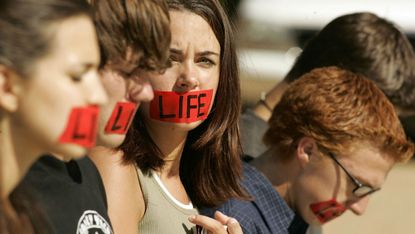‘Forcing women to be mothers is no good for their children’
Your digest of analysis from the British and international press

1. Texas’s new abortion law is a step too far
Caitlin Moran in The Times
On enforced motherhood
“Forcing women to be mothers is no good for them or their children,” wrote Caitlin Moran for The Times, in response to the ban on abortion in Texas. The columnist argued that “what we’re talking about isn’t a right to abortion, but the now legal ability for Texas to enforce motherhood. Texan women are now compelled to become mothers.” Far from being legislation that “really cares about the lives of babies” or being about “making a better, happier or more moral and stable society,” it is “a craven, vicious law that punishes women simply for being fertile and impregnable”. She thunders that the controversial law is, “in its lifelong impact, a piece of non-choice as barbaric as child marriage or sex-trafficking” and one that is “seeking to utterly control women’s futures, bodies, minds and lives”.
Subscribe to The Week
Escape your echo chamber. Get the facts behind the news, plus analysis from multiple perspectives.

Sign up for The Week's Free Newsletters
From our morning news briefing to a weekly Good News Newsletter, get the best of The Week delivered directly to your inbox.
From our morning news briefing to a weekly Good News Newsletter, get the best of The Week delivered directly to your inbox.
2. Charles’s auto-satirical cri de coeur
Marina Hyde in The Guardian
On meritocracy in action
Describing claims of meritocracy on the “diversity and inclusion” page on the official website of the British royal family as an “auto-satirical cri de coeur,” Marina Hyde turned her gaze to accusations that an aide to Prince Charles awarded a CBE to a Saudi billionaire in return for £1.5m. She wondered if the royal believed he was handing the gong to the donor “on merit”. Although the scandal is not ideal for Charles, The Guardian columnist did not feel it would damage him. “Arguably, the two best things going for Prince Charles these days are that he’s not Prince Andrew (who associated with a known paedophile and is accused of worse); and that his institution is under constant criticism from Prince Harry and Meghan (who many people seem to despise even more than paedophiles),” she wrote. “Ultimately, nothing very bad will happen to Charles while his mother remains alive. I’m sure he’ll become king ‘purely on merit’.”
3. How Politico derailed political journalism
Perry Bacon Jr for the Washington Post
On insider issues
Politico’s sale to the German media company Axel Springer for a reported $1bn was the “culmination of a stunning rise” of the US political website, wrote Perry Bacon Jr, but he felt its enduring influence “has been a troubling development for consumers of American political news”. Writing for the Washington Post, he argued that Politico’s focus on “insider politics” saw other mainstream news outlets, such as The Post, the New York Times, drift toward the same model. As an example of why he objects to this, Bacon Jr recalled that in the wake of the 2020 White House election, political reporters who relied on extensive access to Trump staffers “wrote stories implying that the president had no real intention of contesting the election results”, while those without such access “correctly predicted that he was trying to stage a coup”.
4. Tom Kerridge should be applauded for his £87 dish
Rupert Hawksley for The Independent
On high-priced steaks
“There are good pubs and bad pubs; drinking pubs and eating pubs; proper locals and wanky gastros,” wrote Rupert Hawksley for The Independent. “If there is one thing you can’t criticise this country for it is a shortage of pubs.” Therefore, he argued, the fact that the two-Michelin starred Hand and Flowers, owned by Tom Kerridge, offers an £87 steak and chips, despite being described as “unpretentious” is not a contradiction. Amid anger on Twitter over the price tag, Hawksley felt “it is important to stand up to those trying to embarrass a successful business for the crime of charging top whack for what I assume to be excellent food”. He said: “I certainly don’t feel angry at those who do want to cook/eat an £87 steak and chips. I hope they have a jolly good time. All I really want now is a pint. Twitter will do that to a man.”
5. Let's hope ABBA’s comeback is short and Swede
Jeff Apter for the Sydney Morning Herald
On a dodgy comeback
“I’ve got nothing against nostalgia,” wrote Jeff Apter for the Sydney Morning Herald. But he confessed that although he has a “passing interest in the re-emergence of pop titans Abba almost 40 years after what we all assumed to be their Waterloo,” he hoped it will be a short-lived affair. For a start, he argued, their new release, I Still Have Faith in You, is “a song in search of something resembling a great melody or a timeless hook”. Saying that “comebacks of this kind have a dodgy track record,” he said he is left “wondering why Abba opted to tinker with their legacy – weren’t the memories of their golden era enough? Mind you,” he concedes, “those Abba avatars do look kind of cool.”
Create an account with the same email registered to your subscription to unlock access.
Sign up for Today's Best Articles in your inbox
A free daily email with the biggest news stories of the day – and the best features from TheWeek.com
-
 'Good riddance to the televised presidential debate'
'Good riddance to the televised presidential debate'Instant Opinion Opinion, comment and editorials of the day
By Harold Maass, The Week US Published
-
 Caitlin Clark the No. 1 pick in bullish WNBA Draft
Caitlin Clark the No. 1 pick in bullish WNBA DraftSpeed Read As expected, she went to the Indiana Fever
By Peter Weber, The Week US Published
-
 Today's political cartoons - April 16, 2024
Today's political cartoons - April 16, 2024Cartoons Tuesday's cartoons - sleepyhead, little people, and more
By The Week US Published
-
 ‘The UK’s malaise will not end with the Prime Minister’s exit’
‘The UK’s malaise will not end with the Prime Minister’s exit’Instant Opinion Your digest of analysis from the British and international press
By The best columns Published
-
 ‘Police tactics are not getting worse, they are simply being filmed’
‘Police tactics are not getting worse, they are simply being filmed’Instant Opinion Your digest of analysis from the British and international press
By The best columns Published
-
 ‘G7 leaders missed a golden opportunity’
‘G7 leaders missed a golden opportunity’Instant Opinion Your digest of analysis from the British and international press
By The best columns Published
-
 ‘It takes some soul searching to celebrate Canada Day’
‘It takes some soul searching to celebrate Canada Day’Instant Opinion Your digest of analysis from the British and international press
By The best columns Published
-
 ‘Breakthrough on abortion rights could be there if Biden reaches for it’
‘Breakthrough on abortion rights could be there if Biden reaches for it’Instant Opinion Your digest of analysis from the British and international press
By The best columns Published
-
 ‘If only Mark Meadows had even half Cassidy Hutchinson’s courage’
‘If only Mark Meadows had even half Cassidy Hutchinson’s courage’Instant Opinion Your digest of analysis from the British and international press
By The best columns Published
-
 ‘Boris Johnson measures success in biceps rather than brain power’
‘Boris Johnson measures success in biceps rather than brain power’Instant Opinion Your digest of analysis from the British and international press
By The best columns Published
-
 ‘Asking posties to act as community watchmen is an inspired idea’
‘Asking posties to act as community watchmen is an inspired idea’Instant Opinion Your digest of analysis from the British and international press
By The best columns Published